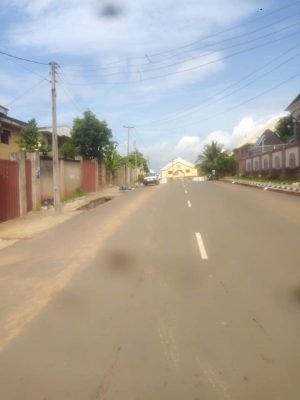
In the heat of the protest that never took place, one of the residents in Enugu, Charles Odune said: “we are the ones to lose because it is when we do our business that we eat. We should look for the best way to honour the fallen heroes, not necessarily closing everywhere. I don’t know what we will gain by this?”
He stressed that Igbos would lose billions of naira because of the closure of markets and other places, noting that Igbo people are predominantly traders.
“Inasmuch as we want to honour those who lost their lives during the Biafran war, must we shut everywhere down?” the frustrated resident asked.
Another businessman, Francis Ugochukwu, said that everyone had to struggle daily for their livelihood, saying that IPOB would not provide food for anyone.
“It is high time we all learned our lesson. IPOB has deceived us a lot with its seat-at-home order and at the end of the whole thing, nothing happens. Enough is enough.”
There was heavy traffic at some major roads, in Anugu, especially the Agbani road axis, as people, including school children and workers, were boarding commercial buses to their different destinations.
Public and private schools in the metropolis were opened for normal academic activities.
Kenyatta, Garki and Akwata markets in the metropolis were opened for business, while traders were busy displaying their goods as usual. The banks were also running normal services.
There was zero compliance to the sit-at-home order in Abakaliki, the Ebonyi state capital as economic activities, movement of vehicles and individuals were hitch-free.
Academic, banking and transportation activities were in full gear in the state.
The major markets in the city namely: Abakpa main market, Mechanic village, building materials market and timber market were all opened for business.
Meanwhile, over 2000 members of the Akubaraoha Youth Assembly led by the former Special Adviser on Youth Mobilisation to Governor David Umahi, Mark Onu, marched around the Abakaliki capital city to ensure total clampdown on the Biafra agitators.
The youth also advised traders not to close their shops.
The movement slowed down traffic along the ever-busy Afikpo road, otherwise, the directive of the outlawed secessionists was not noticed in the state.
As earlier as 6 a.m, officers of the state police command were seen at strategic places to provide security for the people.
Police spokesperson in the state, Loveth Odaa, said officers carried out operation show of force within the state capital and its environs.
She said the IPOB order was a total failure in the state, as no member of the group was seen anywhere during their show of force.
The police spokesperson, however, urged members of the public to report any member of the outlawed group they see in the state to the police.
Residents of Owerri, the Imo capital, also defied the sit-at-home order. The News Agency of Nigeria (NAN) reports that commercial activities went on uninterrupted in Owerri metropolis and its environs.
Banks were open to customers, while commercial activities went on normally in all the markets in the city, including the Relief and Timber markets.
Academic activities were also going on normally in some schools visited in the city.
Michael Ugochukwu, a school administrator, who spoke on why the IPOB’s order was not complied with, said: “We did not tell the students anything about it.
“We allowed parents to use their discretion. Some came while others stayed back.”
Another school owner, Chinwendu Osuji, said that the sit-at-home order was not captured in the list of holidays for the current academic session.
According to Osuji, “the school did not think it was wise to add an unofficial holiday to the week, having already observed May 27 and 29 as public holidays, respectively.
“We already observed a holiday for two days this week and we didn’t see the need to add an unofficial third.
“We did not announce it, even though some parents held their children back at home, probably for fear of the unknown.”
Also, Anthony Obinka, a commercial vehicle operator, said, “Whether or not there is a holiday, people have to feed. So I came out to look for my daily bread.”